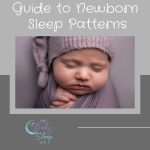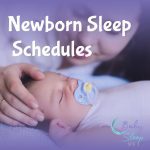
As a mom or dad, you already know that the first year of your baby’s life is a year of incredible growth and development. The average baby triples his birthweight by age 1 and grows an incredible 10 inches in that first year. And that’s not all — between birth and 12 months, your baby will learn to roll over, sit up, creep and crawl, and perhaps even walk.
Impressive, right?
Your baby’s sleep patterns will change pretty significantly in the first year, too. And that’s what we’re exploring in today’s blog article: how our babies’ sleep needs and patterns change in the first 12 months of life.
Sleep Patterns from Birth – 3 Months
 Newborns sleep A LOT in the early weeks after birth — the average newborn needs about 16-17 total hours of sleep! But as you experienced parents know, that sleep is very broken up. Newborns need to eat every 2-4 hours, and most newborns sleep for an hour or two at a time (and sometimes even less than that!)
Newborns sleep A LOT in the early weeks after birth — the average newborn needs about 16-17 total hours of sleep! But as you experienced parents know, that sleep is very broken up. Newborns need to eat every 2-4 hours, and most newborns sleep for an hour or two at a time (and sometimes even less than that!)
By 4-6 weeks of age, newborns need more like 14-16 hours of sleep each day. By 8 weeks of age, some (although not all!) babies will start to sleep for shorter periods during the day and slightly longer periods at night (although babies will still wake multiple times each night for feedings).
While these sleeping patterns are exhausting for us parents, rest assured that they’re quite normal — and necessary — for newborns. Remember that while there are steps we parents can take to improve sleep during the newborn stage and to help our newborns establish healthy sleep habits, it’s far too early to expect our newborns to stick to a strict sleep and feeding schedule, or to sleep straight through the night without feedings. That will come later.
Sleep Patterns from 3 – 6 Months
 By 3 or 4 months of age, your baby is officially out of the newborn stage, and you may notice that your little one’s sleep is slowly starting to organize itself into shorter daytime naps and longer periods of night sleep (although again — not all babies do this by 3 months.) If your baby starts to naturally create her own schedule, then roll with it! If not, though, don’t worry — she’ll be ready in another few months.
By 3 or 4 months of age, your baby is officially out of the newborn stage, and you may notice that your little one’s sleep is slowly starting to organize itself into shorter daytime naps and longer periods of night sleep (although again — not all babies do this by 3 months.) If your baby starts to naturally create her own schedule, then roll with it! If not, though, don’t worry — she’ll be ready in another few months.
Naps may become more clearly defined at this point. 4 month olds need about 5 naps during the day. 6 month olds need more like 3 or 4 naps each day. Don’t worry if these naps don’t happen at the same times each day. Some babies this age will nap very predictably, but others won’t until later.
During this stage, the 4 month sleep regression can happen. This is a point at which your baby’s sleep patterns change permanently. It’s also the reason why some babies who have been sleeping like…well, like babies…suddenly start waking frequently and sleeping a lot less. This is also the point at which you can start sleep coaching your baby (although this is the earliest recommended age for sleep coaching, so it’s also fine to wait a bit longer.)
While some babies will start to sleep through the night by this point, others won’t, and that’s perfectly okay. Many 6 month olds still need 1 – 2 nighttime feedings. However, by 6 months of age, your baby should be sleeping for longer stretches at night and shorter periods during the day.
Sleep Patterns from 7 – 9 Months
 By 7 months, most babies are ready to follow a fairly predictable daytime schedule (although it doesn’t necessarily need to be a rigid one.) At 7 months, your baby will need between 2 or 3 naps during the day (that 3rd nap will probably be a catnap, if your baby is taking 3 naps). By 8 months, however, you should be able to move to two naps a day – a morning nap and an afternoon nap.
By 7 months, most babies are ready to follow a fairly predictable daytime schedule (although it doesn’t necessarily need to be a rigid one.) At 7 months, your baby will need between 2 or 3 naps during the day (that 3rd nap will probably be a catnap, if your baby is taking 3 naps). By 8 months, however, you should be able to move to two naps a day – a morning nap and an afternoon nap.
Don’t forget that another sleep regression can happen during this time, and it can really disrupt sleep. The sleep regression that happens around 8 or 9 months is mostly due to all the physical development your baby is experiencing around this time — learning to crawl, pull up to standing, cruise, and perhaps even take steps! While this kind of development is so exciting to watch, it can definitely interfere with sleep.
While one night feeding is still considered normal at this point, we usually recommend an attempt to night wean around 9 months. This will help you determine whether your baby still needs one feeding at night (which may be the case), or if your baby is waking more out of habit, and less out of a real need to eat.
Sleep Patterns from 10 – 12 Months
 By this age, most babies are sleeping through the night and feeding only during the day. (Although some babies will continue to need one night feeding up to 12 months.) Most babies are taking two naps per day by 10 months. While most people assume that babies transition to needing just one nap per day around 12 months, this is actually a misconception. Most babies aren’t ready to make that transition until somewhere between 15 – 18 months.
By this age, most babies are sleeping through the night and feeding only during the day. (Although some babies will continue to need one night feeding up to 12 months.) Most babies are taking two naps per day by 10 months. While most people assume that babies transition to needing just one nap per day around 12 months, this is actually a misconception. Most babies aren’t ready to make that transition until somewhere between 15 – 18 months.
At this point, if your baby still doesn’t have a predictable daytime schedule in place, work to create one. This will help ensure that your baby is getting enough sleep, and that her sleep is organized well. (For example: She’s getting enough naptime sleep, but not so much that it affects her nighttime sleep amounts.)
Speaking of predictable schedules… Be sure that your baby’s schedule includes a consistent bedtime. Consistent bedtimes are a key component of a good daily schedule. There’s also evidence to suggest that creating a habit at an early age of going to bed at the same time each night may benefit our children when they’re a little older. School-aged children who go to bed at the same time each night may be better behaved and may perform better in school.








